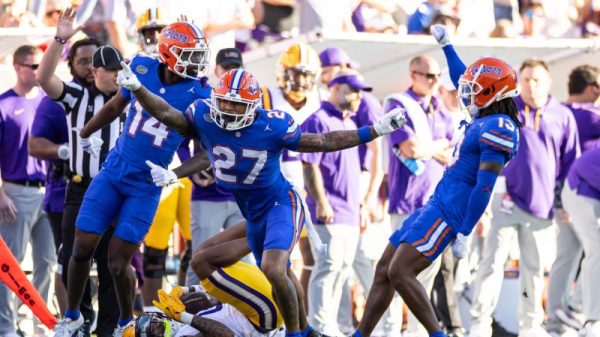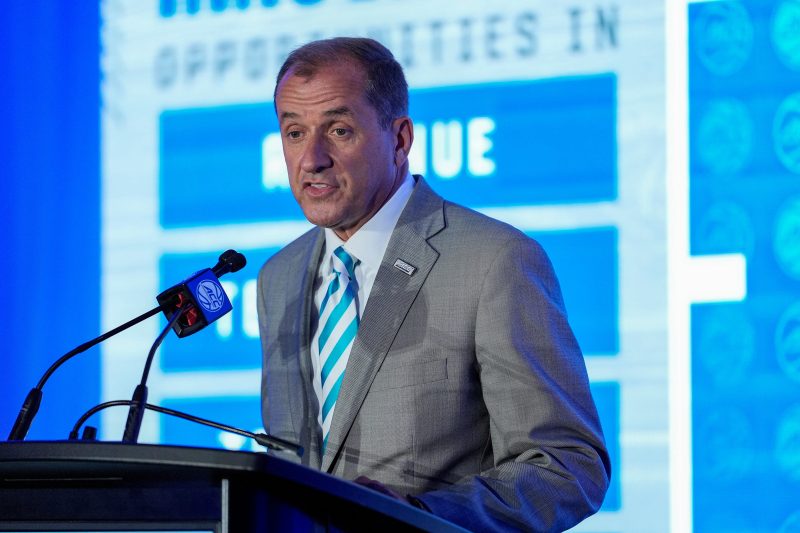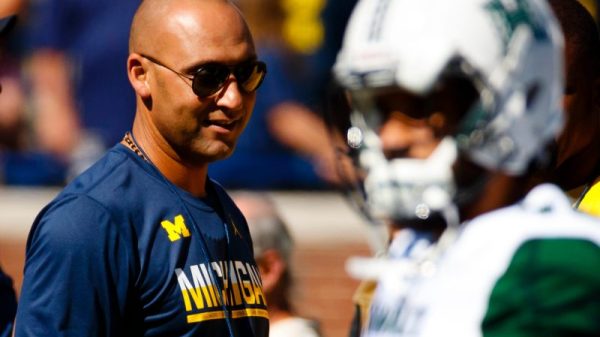CHARLOTTE, N.C. — No matter where you find Jim Phillips, the Atlantic Coast Conference’s perpetually buoyant commissioner, and no matter what storm he’s navigating at any given moment, his weather forecast seems to be the same.
It’s always sunny in Phillipsdelphia.
“I feel great about the league,” he told USA TODAY Sports. “I feel great about its future.”
Not everyone around the country shares his optimism. Once considered an equal partner among the power conferences, the 71-year old ACC finds itself in a strange position.
Despite continuing to win across the board —it had three Elite Eight teams in the most recent NCAA men’s basketball tournament, a women’s Final Four team, robust success in Olympic sports and two of the top 11 teams in the football poll — the narrative that surrounds the ACC these days centers largely on the bruising legal fight with Florida State and Clemson, two prominent members who are suing to break the contract that binds them to the conference until 2036.
There is also, on this particular Thursday, the not-so-small matter of what’s going on 400 miles west of here. As the ACC holds its annual preseason basketball media event, administrators from the SEC and Big Ten are meeting in Nashville, Tennessee, for a strategic conversation that could be interpreted as a step toward the two richest conferences reshaping college sports.
Notably, there was no invitation for the league that has won three of the last 11 football national titles, three of the last 10 men’s basketball championships and a conference-leading 23 NCAA titles across all sports over the last three years.
“I don’t want to read too much into it,” Phillips said. “I think you have to pay attention, you have to understand what’s happening in order to chart your course. We’ve spent a lot of time together, the four (power conference) commissioners, about how we’re going to move forward with a new structure and governance and we’ve worked collaboratively. I don’t want to be paranoid about anything. I’m pretty level about it, and in all of these things I think there needs to be transparency. That’s how you build trust and that’s how you’re able to work together. So we’ll see what comes out of it.”
Though there’s no expectation the SEC and Big Ten are going to immediately pull away from the NCAA or unilaterally overhaul the structure of college sports with the snap of a finger, there is undeniable creep toward a world where those two leagues control at minimum what the top level of football looks like and perhaps a lot more.
Automatic bids for the College Football Playoff? Revenue hoarding? Stacking the deck in an expanded basketball tournament? Writing the rules that will govern player compensation and movement if the NCAA can’t get stop its losing streak in federal courts?
It might all be on the table. And if the ACC isn’t an equal partner in that conversation despite all of its success, its history, its major markets and its current success, is it still a power conference? What is its future? Does it have one that even remotely resembles what the ACC has looked like for nearly three-quarters of a century?
“We line up and we compete and we play well and we win,” Phillips said.
WEEKEND FORECAST: Expert picks for every Top 25 game in Week 7
MAJOR KEY: The one indicator that predicts transfer quarterback success
In a sane world, that should be enough. But when’s the last time college sports seemed sane? Even here — let’s be honest — it’s a little strange to see an ACC basketball event that now includes California, Stanford and SMU. The ACC may be the most idealistic of the four major conferences in some ways, but it is also interested in survival.
And make no mistake, that survival has been under some form of threat since last year when the Pac-12 fell apart, minting a new power structure where nearly all of college football’s biggest brands and the lion’s share of its television riches are now providence of the Big Ten and SEC.
That shift was the breaking point of some longstanding agitation between the group of ACC schools that provide the league’s football heft and those who don’t move the needle. Clemson and Florida State, in particular, see the growing revenue gap with the SEC and Big Ten and wonder how long they can continue to keep up (even though neither of them have shown any need to slow their spending).
The bottom line is that if Clemson and Florida State win their free agency in court, the ACC is going to be in legitimate, perhaps existential trouble. Recent reports have indicated that Florida State and Clemson are open to some type of negotiation to stay in the league, perhaps with a boost in their guaranteed revenue distribution, but there’s no timeline on when and how this ultimately gets resolved.
Meanwhile, the ACC exists in a state of long-term uncertainty, with Phillips playing the happy warrior and constantly talking up his league’s strengths rather than its challenges.
“In the simplest form, there are three destinations to this thing, right?” he said. “One is the legal process, and you either win or you lose. Or there’s some type of reconciliation. I expect the legal case to be lengthy.”
Phillips can’t say much more than that, but the ACC has no choice other than to fight. After all, Clemson and Florida State signed the league’s grant of rights in 2016 — a document that literally grants its media rights to the conference for 20 years. If Clemson and Florida State successfully get out of that agreement, it essentially makes every school a free agent to change conferences at will.
Though every conference understands how disastrous that could be for college sports — think about the chaotic state of the transfer portal, only for entire athletic departments — there are buzzards swarming over the Southeast and mid-Atlantic, waiting for a carcass to emerge.
The SEC would almost certainly have interest in North Carolina and maybe Virginia. If the Big Ten wants to look to the Sun Belt, Miami and Georgia Tech would be interesting academic and market fits. The Big 12 has held off on more additions, in part, because they want to see what might play out in the ACC. Imagine Duke in a basketball conference with Kansas, Baylor and Arizona.
But in the end, none of these realignment fantasies should be necessary. If the venerable ACC of all conferences isn’t good enough to sit at the big boy table in college sports — and if it members don’t feel like this conference provides a platform for the athletes to compete, win and thrive — who and what is this whole thing for?
The ACC isn’t a failing league or business. If anything, it’s never had more to brag about. It wins in every sport. It has its own conference network. It just surpassed $700 million in revenue for the first time in a fiscal year.
If the schools can’t make this work, the ACC may not be the problem.
“Things are good,” Phillips said.
But it only matters if the schools in his league believe it.






























